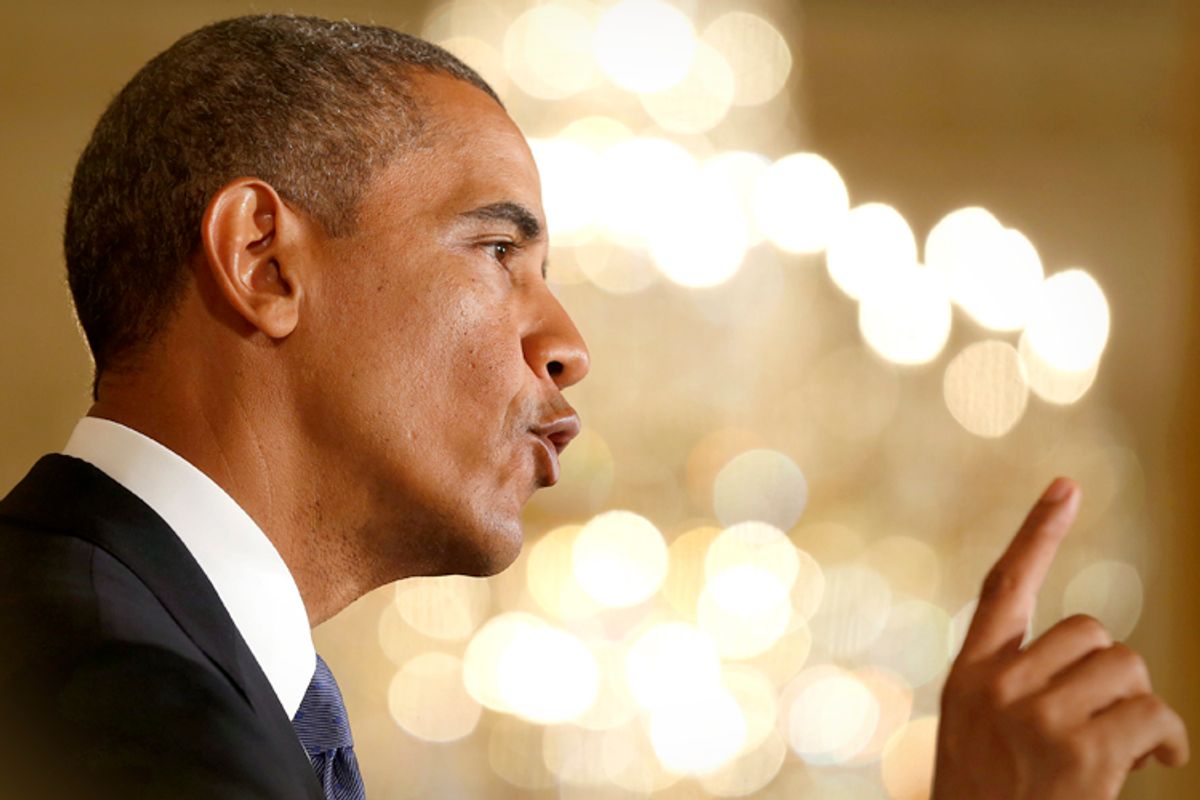There should be little doubt about the historic importance of President Obama's comments today on the Trayvon Martin killing, especially coming in a week of so much news about race, profiling and preemptive violence in America.
Personalizing the murder in a way only the first African American president could, he said "Trayvon Martin could have been me 35 years ago," referenced th "history of racial disparity in our criminal laws" and stated the obvious but taboo truth: that "if a white male teen was involved in the same scenario, top to bottom, both the outcome and the aftermath might have been different."
America hardly ever gets to hear these kinds of important truths in its popular culture and news coverage, much less from the highest-ranked professional politician in the nation. Whether it is pervasive propaganda about supposed "color blindness" or paeans to a supposedly "post-racial" nation, we remain a country whose dominant culture goes out of its way to pretend that systemic racism doesn't exist -- even as the instruments of such systemic racism persist.
These days, such instruments have more deceptive names than they did in decades past, when overt racism was acceptable; they are euphemistically called "stand your ground" or "stop and frisk," making them seem to casual onlookers like entirely race-neutral programs, even though they most certainly are not.
So when a president of the United States uses the bully pulpit to spotlight and effectively criticize such institutional racism, he is making history by exposing -- and thus ripping way -- the camouflage that shrouds such racism. As Joe Biden might say, this is a "big f-ing deal."
An even bigger, more historic deal, of course, will be if the president's comments signal a turning point in the administration's actions -- a turning point whereby the administration stops tolerating and, at times, promoting, institutional racism.
As alluded to above, this week was filled with news about that part of the president's record, too.
For instance, this week saw the president promote the candidacy of New York City police commissioner Ray Kelly as the possible next head of the Department of Homeland Security. As I and others documented earlier this week, Kelly is one of the architects of "stop and frisk." He has overseen the disproportionate deployment of law enforcement resources against communities of color. And he has let the CIA infiltrate his police department for purposes of surveilling communities based on religious affiliation. To even praise Kelly, much less float him to head Homeland Security, flies in the face of the comments Obama made today. Indeed, as The Atlantic's Conor Friedersdorf put it:
Here we are in 2013 watching the first black president and a prominent senator, both Democrats, along with centrist and center-left journalists, enthusiastically avow that a man who needlessly ethnically profiled and harassed the most vulnerable minority group in the United States would be an excellent choice to lead a sprawling national-security bureaucracy that has as big a capacity for violations of civil rights and civil liberties as any part of the government.
As Zaid Jilani astutely remarked, in light of Kelly's record, the Obama Justice Department should not just be investigating the Zimmerman case -- it "should be investigating Ray Kelly and Bloomberg, not praising them."
Likewise, this week saw a New York Times op-ed published by the grandfather of 16-year-old American Abdulrahman al-Awlaki, begging the U.S. government to explain why it incinerated his grandson in a drone strike. As NBC News has shown, these strikes are often carried out with lethal force based on the kind of mass profiling system -- racial, ethnic, geographic or otherwise -- that defines the profiling system that Obama implicitly decried in his statements about Martin. This, no doubt, is why (as documented here) so many people of color drew comparisons between George Zimmerman's ideology and Obama's drone-war ideology.
And, as this week has seen more wrangling about immigration reform, activists and lawmakers have intensified their calls for Obama to halt more mass deportations until the reforms are passed. The calls highlight how the administration's historically unprecedented deportation rate has, according to the ACLU, resulted in a system of racial profiling against Latinos.
Why, in light of such a record, should anyone take today's historic statements by the president seriously? It is, alas, a fair question. The record, after all, does speak volumes. But, then, perhaps timing is everything.
Perhaps all of these different examples of systemic bigotry culminating in one week are beginning to force the White House to fundamentally reevaluate its posture.
Perhaps the grotesque institutional racism that presumes people of color guilty and that justifies preemptive violence is now becoming so obvious to so many people that the president feels he must act more forcefully against it.
In short, perhaps we can finally hope the words of the president are just the beginning of more assertive action -- and if not from him, then from a country that forces him to turn words into policy.

Shares